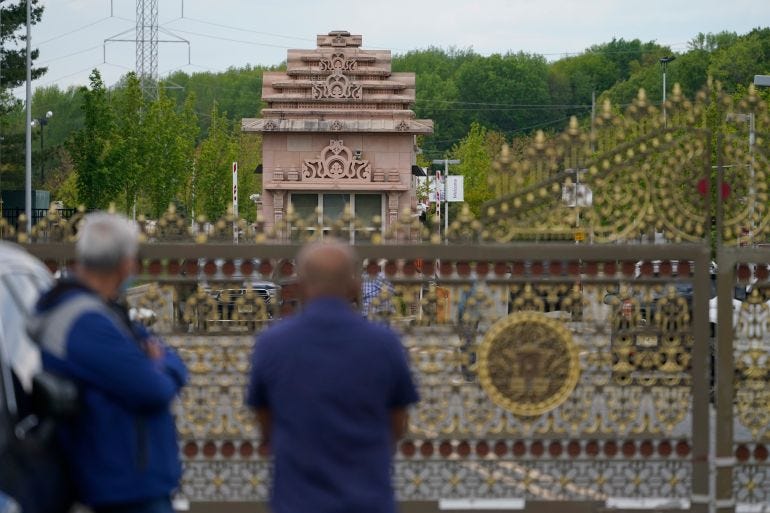Caste, Death & Labor in New Jersey: Why Six Dalit Workers Sued the Robbinsville Temple
Words by Ronita Choudhuri-Wade
Welcome to the Brown History Newsletter. If you’re enjoying this labour of love, please do consider becoming a paid subscriber. Your contribution would help pay the writers and illustrators and support this weekly publication. If you like to submit a writing piece, please send me a pitch by email at brownhistory1947@gmail.com. Check out our Shop and our Podcast. You can also follow us on Instagram and Twitter.
Caste, Death & Labor in New Jersey: Why Six Dalit Workers Sued the Robbinsville Temple by Ronita Choudhuri-Wade
Moham Lal was dead. That was clear to all. They saw his lifeless body be whisked away by supervisors from the construction site. Questions about his death were not being tolerated. But the remaining workers, close to a hundred hidden away in the dark woods behind the ornate sandstone temple in Robbinsville, knew one thing for sure, “we don’t want to die like that.”
What happened in Robbinsville?
The BAPS Shri Swaminarayan Mandir in Robbinsville, New Jersey, was to be the largest Hindu temple in the United States. But on May 11th, 2021, it was the site of one of the country's most significant cases of caste exploitation. Six workers at the site- Mukesh Kumar, Keshav Kumar, Devi Laal, Niranjan, Pappu, and Brajendra, all of whom are Dalit- and supported by 200 more, came forward in a class action lawsuit in the New Jersey district court for charges against the Bochansawasi Shri Akshar Purushottam Swaminarayan Sanstha (BAPS) temple.
The court documents outline that the men, at a blare of an early morning siren, worked more than 12 hours a day, seven days a week, through rain and snow, on the ever-expanding temple site. Their monthly pay was $450 (a little more than Rs. 36,000 by today’s exchange rate). That equates to only $1.20 an hour- less than 10% of the NJ minimum wage of $14.13 an hour- and a violation of state law. Although a worker would be lucky to get his full payment and not lose it to deductions for mundane acts like ‘briefly idling or smoking.’ There was no overtime pay.
BAPS identifies itself as a socio-spiritual organization that works on “improving society through individual growth by fostering the Hindu ideals of faith, unity, and selfless service,” per its website. It can be categorized as a denomination of Hinduism, with temples across multiple continents and millions of followers globally. Alongside its focus on charity, there are strict rules on conduct, alcohol, and food. Men and women are often separated in BAPS temples.
In Robbinsville, life for the workers was tightly controlled on the fenced-in BAPS temple grounds. The organization had taken the workers' passports as soon as they crossed customs at JFK, rendering them unable to return home until allowed. Workers also couldn’t leave the temple premises unless they were with a supervisor, or speak to anyone that visited the temple. If they did, the supervisors had told them that their pay would be reduced, that the American police would come after them, or there would be physical harm. In the few hours the workers were not working, they slept in trailers, in conditions that the governor of New Jersey described as “horrific,” concealed within the woods. Mirroring a reality for many Dalits in India, the workers were to be neither seen nor heard.
Although, deep inside the temple’s main office, there were TV screens streaming video from over 50 cameras that kept an eye on the workers during work and outside their trailers at all times.
What the court case also unfolded was what appeared to be consistent manipulation of the US immigration code for over a decade to bring low-income labor to the U.S. The BAPS organization filed the labourers' visas under the religious “R-1” visa, allotted for those doing religious work, ministers, members of the denomination, or religious volunteers. The reality was that almost all the workers were not BAPS members or followers of the sect. And let’s be clear, no one was volunteering at the construction site.
There was danger in the work at the Robbinsville temple for body and soul. Moham Lal, Mukesh, Pappu, Devi Laal, Niranjan, Brajendra, and countless more were pushing and pulling stones that weighed tons, inhaling the particle dust of cut stones, and being exposed to harsh chemicals. There was nearly no time off, and exhaustion was rampant. And then, Moham Lal’s death landed a blow to the workers.
To make things even worse, they realized that the BAPS authorities were organizing his last rites according to their rituals, not Moham Lal’s own beliefs. It was unacceptable. The workers let it be known and demanded better working conditions so that this never happens again. The organization’s authorities retaliated. Mukesh, who led the worker’s demands, very quickly found himself back in India without work. But he held a lifeline that could help the many men still captive in the hazardous site.
But before moving forward, let's go back to where it started.





